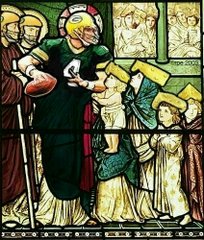 Dear Saints of God,
Dear Saints of God,If you would like to hear the sermon preached at Trinity Lutheran Church in Layton, Utah for the Tenth Sunday after Trinity, "Hanging on His Words," click on this MP3 audio link. The audio includes the Hymn of the Day, LSB #644, "The Church's One Foundation." The sermon begins at the 3:45 mark.
Have a great week in Christ as you are hanging on his words for eternal life.
A servant of the Word and His folk,
Pastor Hering
Here the preaching manuscript if you prefer to read along or read instead.
TEXT: 41When [Jesus] drew near and saw the city, he wept over it, 42saying, "Would that you, even you, had known on this day the things that make for peace! But now they are hidden from your eyes. 43For the days will come upon you, when your enemies will set up a barricade around you and surround you and hem you in on every side 44and tear you down to the ground, you and your children within you. And they will not leave one stone upon another in you, because you did not know the time of your visitation."
45And he entered the temple and began to drive out those who sold, 46saying to them, "It is written, 'My house shall be a house of prayer,' but you have made it a den of robbers."
47And he was teaching daily in the temple. The chief priests and the scribes and the principal men of the people were seeking to destroy him, 48but they did not find anything they could do, for all the people were hanging on his words. Luke 19:41-48
Dear Saints of God,
You too are hanging on His words today.
The Holy Spirit has brought you to where you can find Jesus so you can live now and forever by "hanging on His words. "
In our Gospel today He is to be found in Jerusalem—the city founded by God to be a city of peace and safety. That city of peace and safety is where the people were "hanging on His words," thus preventing the chief priests and scribes from destroying Jesus—at least that day, for His time had not yet come.
However, by the end of the week it would be Jesus, the very Son of God, who would be hanging on His own words for all the people, pouring His blood out and dying on the cross for them so that by hanging on His words they, and you, would not be destroyed eternally.
Yes, Jesus comes for that very reason, to bring with Him righteousness and peace--and the safety that goes with it--on this day in history recorded for us by Luke, who wrote as an historian as well as an evangelist--it seemed good to me also, having followed all things closely for some time past, to write an orderly account for you, Luke 1:3.
But that peace and safety comes at great cost. For the price is His holy precious blood and His innocent suffering and death—suffering and death that every one of His followers including His disciples then, you now, and every baptized child of God until He comes again must indeed share. So, When [Jesus] drew near and saw the city, he wept over it, 42saying, "Would that you, even you, had known on this day the things that make for peace! But now they are hidden from your eyes.
He has come to bring peace to His people in the heavenly realm, that is, in the presence of God there is safety because He has come to forgive the sins that separate us from Him and earned His wrath. But the way He does it is just not easy to take—in fact, impossible for men apart from the work of the Holy Spirit. Hanging on His words with Him is simply not something our flesh is inclined to do by choice.
So to those who live the life of the flesh Jesus gives warning:
Do not think that I have come to bring peace to the earth. I have not come to bring peace, but a sword. Matthew 10:34
For the word of God is living and active, sharper than any two-edged sword, piercing to the division of soul and of spirit, of joints and of marrow, and discerning the thoughts and intentions of the heart. Hebrews 4:12
As awful as that sounds, it is just what we need, in order that you may continue to hang on His words, which is nothing other than faith. God sends and keeps sending messengers to bring that sword, that Word of God to His people who have such a hard time receiving and believing it that they often fall prey to the wolves in sheep clothing who bring another Gospel, another Jesus than the One who goes to the cross--hanging on His own words for us--and baptizes us into His death and resurrection in which He is hanging onto us by His words.
4"You shall say to them, Thus says the LORD:
When men fall, do they not rise again? If one turns away, does he not return? 5Why then has this people turned away in perpetual backsliding?They hold fast to deceit; they refuse to return. . . . Everyone turns to his own course, like a horse plunging headlong into battle. 7Even the stork in the heavens knows her times, and the turtledove, swallow, and crane keep the time of their coming, but my people know not the just decrees of the LORD. . . . "How can you say, 'We are wise, and the law of the LORD is with us'? But behold, the lying pen of the scribes has made it into a lie. 9The wise men shall be put to shame; they shall be dismayed and taken; behold, they have rejected the word of the LORD, so what wisdom is in them? . . . from the least to the greatest everyone is greedy for unjust gain; from prophet to priest, everyone deals falsely. 11They have healed the wound of my people lightly, saying, 'Peace, peace,' when there is no peace. [Jeremiah 8:4-11]
O Jerusalem, Jerusalem, the city that kills the prophets and stones those who are sent to it! How often would I have gathered your children together as a hen gathers her brood under her wings, and you would not! Luke 13:34
So because of all of this
• Because of all of the rejection and unbelief His Word and messengers will meet in Jerusalem and wherever they go
• Because of all the suffering and death He knows His followers, He knows YOU will have to endure
• Because He knows the devil has you targeted as an individual since both Christ and His church are safe and at peace with God [Revelation 12:17]
"When [Jesus] drew near and saw the city of God," Jesus wept for Jerusalem,"--and all her citizens past, present, and future-- just as He had also wept for Lazarus before calling him out of the tomb back into the world of trial and tribulation. And just as He wept for Jerusalem that day He wept also for you and the trials, tribulations, and death you must face like every one of His dearly beloved and baptized saints.
But there is something else for us to learn from our Gospel today and never forget. It is something that every Lutheran pastor is taught, something with which he and his congregation must agree , and something which is to form everything we do in our Lutheran churches.
". . . in those things which concern the spoken, outward Word, we must firmly hold that God grants His Spirit or grace to no one, except through or with the preceding outward Word, in order that we may [thus] be protected against the enthusiasts, i.e., spirits who boast that they have the Spirit without and before the Word, and accordingly judge Scripture or the spoken Word, and explain and stretch it at their pleasure, . . .
All this is the old devil and old serpent, who also converted Adam and Eve into enthusiasts, and led them from the outward Word of God to spiritualizing and self-conceit, and nevertheless he accomplished this through other outward words. 6] Just as also our enthusiasts [at the present day] condemn the outward Word, and nevertheless they themselves are not silent, but they fill the world with their pratings and writings, . . . " [SMALCALD ARTICLES: PART III ARTICLE VIII.3, OF CONFESSION]
So to protect us from the false prophets, from our own enthusiastic feelings, and even from the very devil himself, Luther explains this Gospel lesson preaching that, "Christ drove out the merchants that pandered to base appetites, and made room for his Word." Why? Because "The things that make for peace" are never to be found in the visions, feelings, or works of men—no matter how pious and well-intentioned. They are only to be found in the express will of God as revealed in His Holy Word, and confessed in the teaching and practice of His Holy Christian Church. And they are certainly never up for sale.
After hanging on His own word—by which He suffered, died, was buried, rose from the dead—He has now ascended to the right hand of the Father in heaven, from whence Jesus now sends the Holy Spirit to point you and even bring you to where He is to be found.
• Always through the cross.
• Always to have us live in the Baptism that makes us one with Him
• Always preaching repentance and the kingdom of heaven
• Always to have us confess and be absolved
• Always to draw us to the table of His very body and blood.
• Always by the power of the Holy Spirit at work in His body here on earth, The Holy Christian Church.
• Always forgiving your sins and giving you the name of the One Who Is Faithful so you can always be hanging on His words for eternal life-- the name of the Father ,and of the + Son, and of the Holy Spirit. Amen








